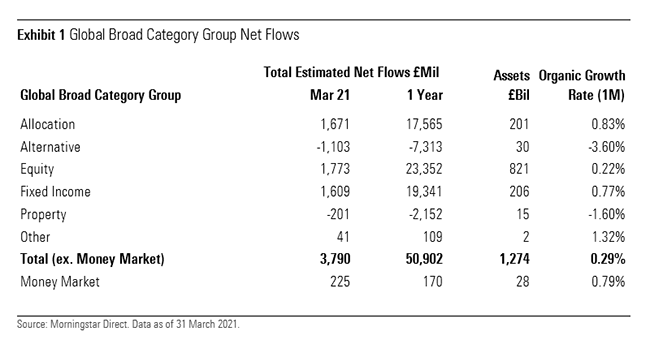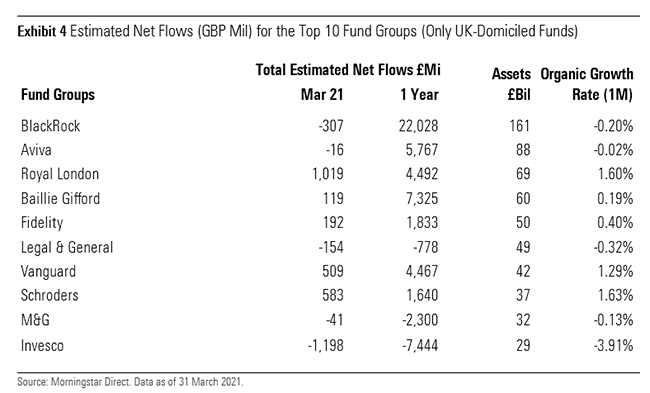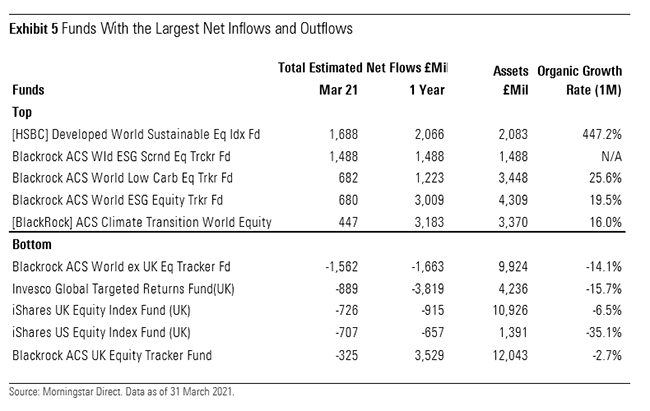
Investors have added £50 billion to UK funds in the year since the March 2020 market crash, according to the latest Morningstar data, underlining the strength of the market recovery that has continued well into 2021.
On a monthly basis, some £3.8 billion was put into UK funds in March, nearly double the amount in the previous month. Buoyant stock markets during the month helped make the case for equities, which brought in over £1.7 billion, with many indices hitting new records. But allocation and fixed income funds also remained in favour. And sustainable funds dominated the top 5 list of most popular funds in March.

Equity funds attracted the most inflows for the month at £1.7 billion but allocation and fixed income were not far behind with more than £1.6 billion invested in each. Over the year, equity funds remain out ahead with £23 billion of new money invested, compared with £19 billion for fixed income and £17 billion for allocation since March 2020.
Digging deeper into the categories, Global Large-Cap Blend Equity was the runaway winner for the month with £3.1 billion of inflows. “The category saw one of its largest ever net flows in March, primarily driven by a large shift into three of BlackRock’s ESG trackers,” says Bhavik Parekh, manager research analyst at Morningstar. These funds, while available to retail investors, have been most popular with institutional investors and large pension schemes, he adds.
The next most popular category way was Global Emerging Markets Equity, which drew in £806 million, with money largely focused on two funds: Royal London Emerging Markets ESG Leaders Equity Tracker and iShares Emerging Markets Equity Index. This surge in flows goes against the grain of emerging market indices, which fell in March as the region's Q1 rally ran out of steam. A rising dollar and increase in coronavirus cases in countries like India has contributed to the cooling in sentiment towards emerging markets.
Looking at outflows, UK Large-Cap Equity had another dismal month with outflows of £1.44 billion, which makes nearly £6 billion of outflows for the year to the end of March. The rotation away from growth companies hit the US Large-Cap Blend Equity category, which shed £1.28 billion in March, although it has still attracted more than £10 billion over the year.

In terms of fund groups, Royal London has snatched the number one slot for the month from Baillie Gifford with inflows of £1 billion, way ahead of the next most popular group in March, Schroders. “Baillie Gifford saw its smallest net inflow since March 2020, as the recent value rotation has dented the performance of some of its funds and with it investor interest,” says Parekh. A beneficiary of this shift in focus has been Schroders, which saw strong inflows into its recovery funds. “The strategies managed by Schroders' global value team have a strong value bias that has helped them perform very strongly in the past six months,” he adds.
While BlackRock suffered outflows in March, it has still attracted more than three times the inflows of the next most popular asset manager over the year. With £161 billion of assets under management, the firm dwarfs Aviva’s £88 billion. Asset manager Invesco suffered its second worst ever monthly outflow and its largest since 2013, with nearly £900 million from Negative-rated Invesco Global Targeted Returns the biggest contributor.

Funds with a sustainable remit make up four out of five of the most popular fund choices for March, and BlackRock funds also dominate this list.
HSBC Developed World Sustainable Equity Index fund saw the most inflows in March of £1.68 billion. The tracker was launched in December 2020 as a partnership between HSBC and Aegon, with assets coming from the Aegon inhouse pension scheme.
While the FTSE 100 has recently pushed above 7,000 points, two UK trackers are in the bottom five funds by outflows. The £10 billion Gold-rated iShares UK Equity Index Fund shed £726 million in March, while the Blackrock ACS UK Equity Tracker suffered £325 million in outflows. Still, it was not all negative for UK funds: the UK Large-Cap category was hit by redemptions to a handful for funds, and UK Flex-Cap, Small-Cap and Mid-Cap categories all received positive inflows.



























